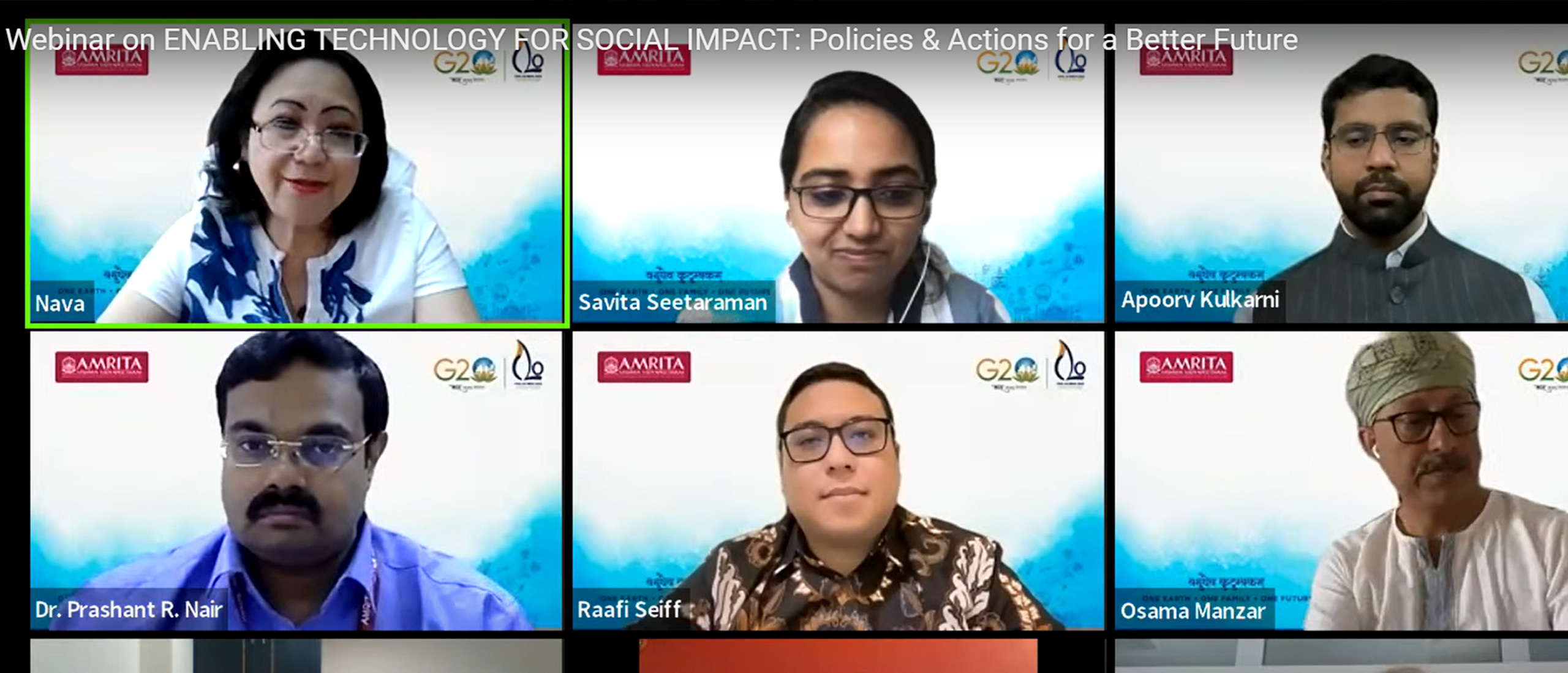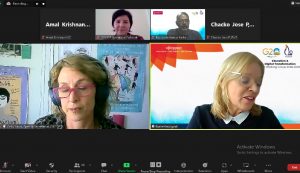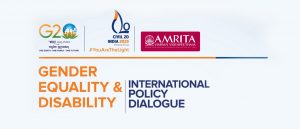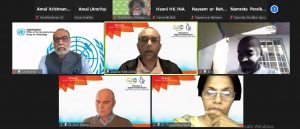The Civil 20 (c20) Working Group (WG) on Technology, Security Transparency (TST) organized a webinar on the theme, “Enabling Technology for Social Impact: Policies & Actions for a Better Future,” on 23 February 2023. Civil Society Organizations (CSO) representatives from 17 countries, including Norway, Finland, Germany, Netherlands, Switzerland, United Kingdom (UK), USA, Australia, New Zealand, Indonesia, UAE, Pakistan, Bangladesh, Kyrgyzstan, China, Peru, and India participated in this webinar. This webinar also attracted CSO participants from 18 states and union territories of India, including Tamil Nadu, Jharkhand, Kerala, Uttar Pradesh, Delhi, Karnataka, Maharashtra, Jharkhand, Andhra Pradesh, Assam, West Bengal, Goa, Odisha, Chandigarh, Jammu and Kashmir, Punjab, Bihar, and Rajasthan. The webinar was chaired by Dr. Nava Subramaniam, Dean, Amrita Vishwa Vidyapeetham, and C20 TST WG coordinator.
Mr. Apoorv Kulkarni, head of research at OMI Foundation, who specializes in mobility innovation, governance, and the public good, emphasized the importance of accessibility in technology for people with disabilities to enable their full participation in the economy. Apoorv Kulkarni is a national award winner for individual excellence as the Sarvshresth Divyangjan, and this award was presented by the Hon’ble President of India, Smt. Droupadi Murmu in 2022. He advocated the need for technological development that enables affordable and straightforward solutions. He provided policy recommendations to C20 TST WG to enhance accessibility, fund technical solutions, and increase affordability for people with disabilities. He highlighted the fact that this is an area that needed appropriate and effective policies and cooperation.
In their research and analysis, OMI Foundation has identified data deficits, accessibility standards & guidelines, awareness gaps, meaningful budgets, and monitoring & reporting as the reasons for the inaccessibility of technology. Their research has underscored that individuals with disabilities represent 15% of the global population per the United Nations and possess $8 trillion in disposable income. However, their inability to participate in the economy results in a 7% GDP cost of exclusion. Therefore, ensuring maximum accessibility of technology for individuals with disabilities is imperative.
Mr. Raafi Seiff, Founder and Director of Policy+, a youth-driven and multidisciplinary think tank based in Jakarta, Indonesia, emphasized how technology can catalyze change through civic engagement. Mr. Seiff reiterated the importance of aligning regulation with needed actions for fundamental social transformation and impact, citing his experience as a member of the Indonesian COVID-19 Task Force.
Mr. Osama Manzar, founder & director of Digital Empowerment Foundation (DEF), highlighted the problem of lack of internet connectivity in rural areas and advocated for the use of technology to make it more affordable and accessible for these communities. DEF is a global CSO that has done impactful work in eradicating information poverty from India and the global south using digital tools. DEF was one of the CSOs showcased for their work in the G20 Compendium of case studies from the previous G20 summit at Bali, Indonesia, in 2022.
Dr. Shelley Marshall, Director of RMIT University Business and Human Rights Center, Melbourne, Australia, brought attention to the problem of gender-based accessibility and emphasized the importance of incorporating gender differences in design and usage.
Mr. Anand Desai, Program Manager-Education from IT for Change, Bangalore, India, and Dr. Suresh Ramakrishnan, Deputy Dean of Research at the University of Technology, Malaysia, discussed the potentially transformative impact of integrating technology in education. The social impact of technology was also seen as not only affordability but a family-cultural one. One example highlighted was the importance of building the technical skills of both the children and their parents to enable the parents to understand and monitor their children’s use of technological devices.
The webinar concluded with valuable insights from Dr. Krishnashree Achuthan, Dean, Amrita Vishwa Vidyapeetham and coordinator of C20 TST WG, and Ms. Alison Richards, International advisor of the C20 TST WG. They highlighted the thematic areas of C20 TST WG, and its upcoming events. They emphasized the need for the WG to explore various technology dimensions such as AI, data privacy, misinformation, and emergent risks from a civil society perspective.




